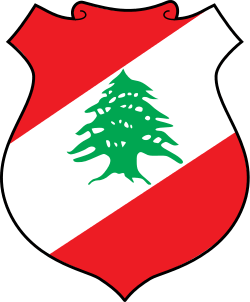Michel Murr
| Michel Murr | |
|---|---|
| Born |
29 September 1932 Metn, Greater Lebanon, French Mandate of Lebanon of the Third French Republic |
| Nationality | Lebanese |
| Occupation | Engineer, politician and businessman |
| Home town |
Bteghrine |
| Religion | Greek Orthodox Church |
| Relatives |
Nayla Tueni Elias Murr Gebran Tueni |
Michel Murr (Arabic: ميشال المرّ) is a Lebanese politician and businessman.
Early life and education
Michel Murr was born to an Greek Orthodox Christian family in the Matn District village of Bteghrine in 1932.[1][2] He studied engineering at St Joseph University and graduated in 1955.[2]
Political career
Michel Murr lived in West Africa during much of the 1960s and made a sizable fortune there in the construction industry.[1] He returned to Lebanon and then, was elected to parliament in 1968 by aligning himself with Pierre Gemayel who dominated politics in the predominantly Maronite Christian Metn district.[2] Murr lost his reelection bid in 1972, a defeat which he is said to have blamed on Gemayel.[1]
After 1975-76 Civil war, he supported the Phalange militia and the Lebanese Forces (LF), but not its "Arabist" camp, along with Karim Pakradouni. In the mid-1980s, he supported the pro-Syrian LF faction of Elie Hobeika and participated in the negotiation of the Tripartite Accord, an agreement by Hobeika, Druze chieftain Walid Jumblatt and Amal leader Nabih Berri that would have legalized the Syrian presence in Lebanon.[1] Hobeika and Murr were subsequently ousted from the LF by Samir Geagea. They spent the rest of the war years in Syrian-controlled Zahle, waiting for the day when Damascus would complete its occupation of Lebanon.[1]
Following Syria's takeover of Beirut in October 1990, he was rewarded for his loyalty to the Syrians and assumed the post of interior minister.[3] Then he also served as deputy prime minister.[4] When he was in office, he openly cooperated with the Syrian authorities.[4] Murr was also appointed interior minister to the cabinet led by then prime minister Salim Hoss in 1998.[5] Murr continued to serve in this post until 2000 when his son Elias Murr replaced him.[3] Before the general elections of 2000, the Metn district was designed by Syrian and Lebanese authorities to facilitate Murr's election victory.[6]
He is the current leader of the Metn Bloc that is an independent political party.[7]
Personal life
His son, Elias Murr, married Karine Lahoud, the daughter of then-army commander Emile Lahoud in 1992.[1] Later they divorced.[8] Michel Murr is the grandfather of Lebanese politician Nayla Tueni and ex-father-in-law of late Gebran Tueni.
External links
 |
| This article is part of a series on the politics and government of Lebanon |
|
References
- 1 2 3 4 5 6 Abdelnour, Ziad K. (June 2003). "Michel and Elias Murr". Middle East Intelligence Bulletin. 5 (6). Retrieved 12 June 2012.
- 1 2 3 Rola el Husseini (2004). "Lebanon: Building political dynasties". In Volker Perthes. Arab Elites: Negotiating the Politics of Change. Lynne Rienner Publishers.
- 1 2 Ferran Izquierdo Brichs (27 November 2012). Political Regimes in the Arab World: Society and the Exercise of Power. Routledge. p. 220. ISBN 978-1-136-24087-4. Retrieved 17 March 2013.
- 1 2 Nisan, Mordechai (1999). "Christian Decline and Models of Lebanon" (PDF). ACPR. 83. Retrieved 17 March 2013.
- ↑ Blanford, Nicholas (1 February 1999). "All change in Lebanon". The Middle East. Retrieved 18 March 2013.
- ↑ Gambill, Gary C.; Elie Abou Aoun (August 2000). "Special Report: How Syria Orchestrates Lebanon's Elections". Middle East Intelligence Bulletin. 2 (7). Retrieved 17 March 2013.
- ↑ "Lebanon Government Profile 2012". Index Mundi. Retrieved 13 June 2012.
- ↑ "Siniora-Murr Spat Nearly Splits Cabinet, But -- Miraculously -- Escapes Media Attention". Wikileaks. 17 May 2006. Retrieved 19 March 2013.